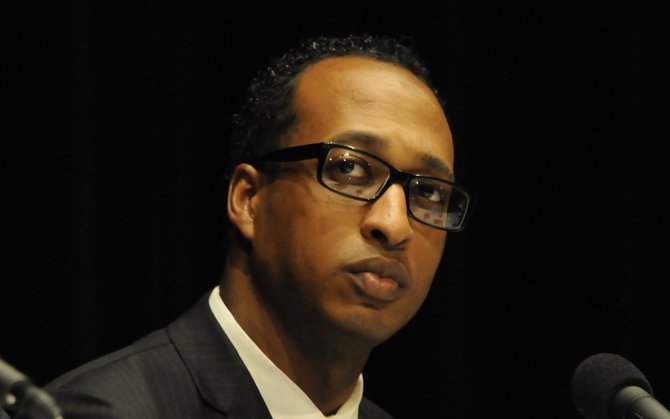Ward 2 Councilman Melvin Priester Jr. and other city officials are preparing to cut programs to balance the city budget. Photo by Trip Burns.
Jackson city officials like to talk about the $1.25 billion worth of investment slated to come to the capital through infrastructure upgrades in the coming years.
Yet, because of problems that have mounted over the past few years, Jackson could face as much as a $14 million budget deficit that will require deep cuts to popular city services, Mayor Tony Yarber said during his first state of the city address on July 24.
"Sacrifices will have to be made for the greater good of our communities. No longer can we afford to carry out functions that don't lead to the progressive genesis we seek. For example, what does it profit the city to devote $500,000 in support to a venue and only receive $20,000 in return?" Yarber said without mentioning any specific programs.
The problem is that there aren't a whole lot of obvious candidates for cuts.
"We don't have a budget that's carrying a lot of fat," said Ward 2 Councilman Melvin Priester Jr., who also chairs the city council's finance committee.
In the coming weeks, Yarber and his budget office will present a financial plan to the city council and Jackson citizens, through budget hearings. Despite a 1-percent sales tax hike that citizens passed in January, which is projected to add approximately $300 million to the city's coffers, and water and sewer fee hikes that went into effect last year, balancing the budget could prove difficult.
The reasons are myriad, Priester said. In the last budget cycle, Jackson dodged a bullet when Jackson Public Schools asked the city council, which sets millage (tax) rates according to what JPS needs to operate, for less money. "We got breathing room from giving JPS fewer mills. This year, without question, giving them the full amount of the mills," Priester said.
In addition, Jackson recently started paying back $1.9 million in community development block grant funds that failed to meet federal guidelines.
Earlier this year, the U.S. Department of Housing and Urban Development determined that Jackson allocated money for several ineligible CDBG projects including for small-business development, the Roberts Hotel, the Electric Building and Metro Market Place, according to a January letter from HUD.
Other budget wild cards include uncertainty around a pair of road-repair projects on Fortification and Capitol streets that recently hit snags.
In his first state of the city address since becoming mayor, Yarber painted a hopeful picture of the capital city's future, but said the road forward would be arduous.
"I cannot promise you that this will be easy. I cannot promise you that every decision I make will be popular. I cannot promise you that we won't have short-comings," Yarber said.
"There will be growing pains, and there will be bruises, but together we can take the necessary steps to make this city what we desire it to be."
While he's the Budget Committee chairman, Priester would like to implement a priority-based budgeting process that would involve soliciting input from citizens to rank the effectiveness of city services and developing metrics for spending based on the highest priorities.
Ward 4 Councilman De'Keither Stamps called Yarber's speech "positive" and "encouraging," and agreed that budget makers will have to prioritize city spending to maximize return-on-investment, but he stopped short of naming any specific programs that need to be cut or reviewed.
"We have a lot of issues around the city of Jackson; we have to invest our dollars (wisely)," Stamps told the Jackson Free Press Monday.



Comments
Use the comment form below to begin a discussion about this content.
comments powered by Disqus